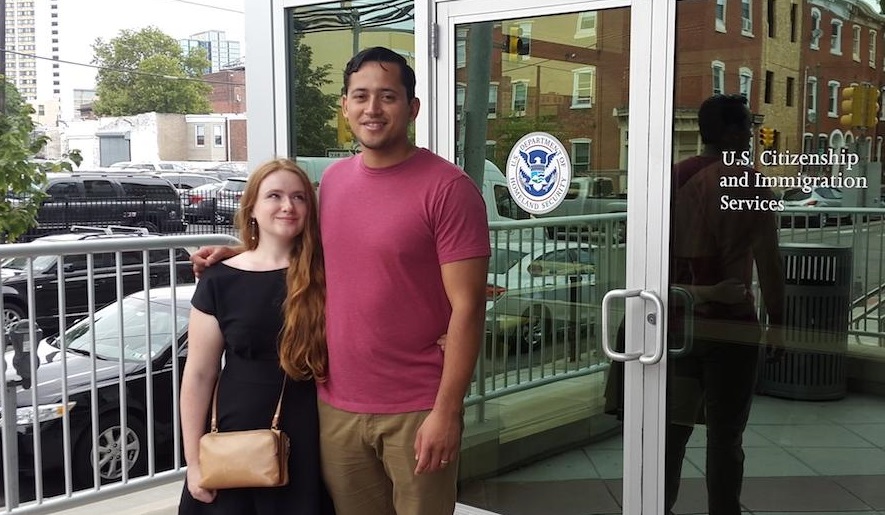

Some people have the opportunity to apply for a green card from inside the United States. This process, known as adjustment of status, often concludes with a green card interview. U.S. Citizenship and Immigration Services (USCIS) typically interviews all applicants for a marriage-based green card and may interview applicants in other family-based categories. Because the adjustment of status process begins by filing Form I-485 (Application to Adjust Status), many people refer to this appointment as the I-485 interview.
There’s reason to be excited about your I-485 interview. It's likely the last step in your application process. If all goes well, you’ll be a permanent resident (green card holder) at the end of the interview. Knowing what to expect, which items to take, and how to respond to questions will improve your chances of a quick approval and reduce your anxiety today.
Table of ContentsUSCIS will generally schedule the interview at an office nearest you. In some areas of the country, this may require a long drive and an overnight stay. For family-based I-485 applications, USCIS generally requires both the applicant and petitioner to attend the I-485 interview. They will make a decision to waive the interview on a case-by-case basis. You can’t request USCIS to waive the interview, and you should always expect one for marriage-based applications. In some non-marriage based cases, USCIS may require only the applicant to attend the adjustment of status interview. However, USCIS does not require employers to attend interviews for employment-based I-485 applications.
Derivative applicants should also expect to attend. If you have a spouse and children that are applying for permanent residence based on your eligibility, they are known as derivative applicants and must appear regardless of the filing category.

The wait to adjust status to a lawful permanent resident can be long and difficult. You’re probably anxious to know…
You'll know it's time for your interview when USCIS mails the applicant the interview appointment notice. Like many other USCIS communications, the appointment notice will be labeled as I-797C Notice of Action.
USCIS will mail the notice for your I-485 interview a few months after filing the application. With an interview date in-hand, you can continue to prepare for your interview.
If you followed the directions in your CitizenPath Adjustment of Status Package filing instructions, you'll have a photocopy of each application and the supporting documents you submitted with them. Review all of these documents. Make sure the information is consistent and current. Has anything changed? You'll have an opportunity to update your information at the interview. Be familiar with the information and ready to answer questions. The USCIS officer will analyze the dates, places of residence, employment and other facts to confirm your eligibility for permanent resident status.
If you are married, spend some time with your spouse discussing the history of your relationship. Make sure you remember your initial meeting the same way. Review the facts and circumstances surrounding your relationship, such as where and how you met, how your relationship developed, who proposed and how, how the family accepted your relationship, any special things you like to do together, etc. Don't assume your spouse will have the same answer. It will be embarrassing and even damaging to your case if you provide drastically different answers to the USCIS officer.
The USCIS appointment notice will include a list of items to take to your I-485 interview. Follow the directions on your appointment notice. Until then, the following list will get you prepared for the green card interview. You should expect to take the following items:
An applicant who is not fluent in English may require the help of an interpreter for the I-485 interview. The applicant is swearing to the facts in the application, and they should definitely take an interpreter if they are not completely comfortable with English.
Also known as a translator, the interpreter should be a disinterested party. In other words, the interpreter should not have a clear bias. For example, the petitioner has a bias to see your application approved and is typically not a satisfactory interpreter. However, you don't necessarily need to pay someone to translate. An immigration officer may exercise discretion to allow a friend of the applicant to act as interpreter. If the officer is fluent in the applicant’s preferred language, the officer may conduct the examination in that language without use of an interpreter.
The interpreter should take a valid, government-issued identity document and a prepared Form G-1256 (Declaration for Interpreted USCIS Interview) to USCIS on the day of the I-485 interview. The applicant and interpreter both sign Form G-1256 at the interview in front of the officer.
The USCIS officer may disqualify an interpreter provided by the applicant if the officer believes the integrity of the examination is compromised by the interpreter’s participation or the officer determines the interpreter is not competent to translate.

Treat the day like a court appointment or job interview. That starts with the way you dress. Avoid flashy jewelry and body art that might lead a USCIS officer to make negative presumptions about you or your character. Dress professionally.
Be punctual. Although it's likely that you'll have to wait for your interview, arrive at the USCIS office at the time instructed.
The USCIS officer will begin the interview by swearing you in. By taking this oath, you've promised to tell the truth, and the consequences are significant for lying to a USCIS officer.
Next, it's likely that the officer will verify your identification documents, such as birth certificates, passports and marriage certificate. Again, take original copies of these important documents. It's unlikely that you'll need them, but having an original ready to go may save you several weeks if they need to verify. They will be returned to you. The USCIS officer will review some of the basic information on the application with you and your petitioner.
The typical adjustment of status interview lasts approximately 20 to 25 minutes. After introductions and swearing in, that doesn’t leave much time for questioning. It’s also not necessary to memorize answers to any questions. For the most part, the USCIS will ask you questions about your application and ask you to verify or explain certain answers. If you’ve truthfully answered questions on Form I-485, there’s no reason to be nervous or anxious.
The USCIS officer will also likely ask if you have had any life changes that may affect your adjustment of status application. The officer is looking for anything that may change an answer on your application. Some examples include the birth a child, new employer, or new address. If your changes include an arrest or troubles with the marriage, speak to an immigration attorney before attending your green card interview.
For applicants that filed an adjustment of status application based on spouse relationship, the questions may get slightly more personal. USCIS wants confirmation that the marriage is bona fide. In other words, they will scrutinize the application more to make sure there’s no marriage fraud. But again, as long as you can be truthful, they are simple questions with simple answers.
This is a small sampling of possible questions. In practice, USCIS can may ask a wide variety of questions to help make a determination if you and your spouse have a bona fide marriage.
Additionally, the USCIS officer will review the Form I-864 Affidavit of Support and supporting documents to ensure the sponsor has sufficient income to meet the requirement. Therefore, consider how any recent changes to your household and income may affect this component of your application. For example, be ready to address the situation if the sponsoring petitioner lost a job. Consider attending the interview with an additional Affidavit of Support from a joint sponsor if there's any reason to believe the petitioner's affidavit won't be sufficient to sponsor the intending immigrant.